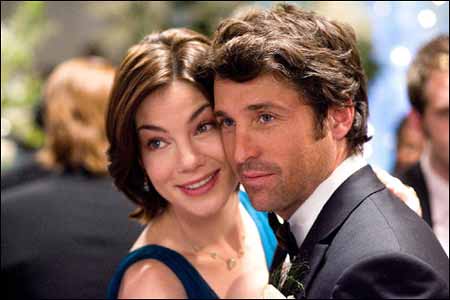|
Click here to return to the main site. Patrick Dempsey (Tom) - Made of Honour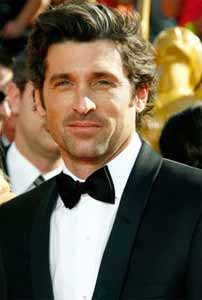 Patrick Dempsey was born on 13 January 1966, in Maine, USA. As a teenager he was placed third in his age group at the National Jugglers Convention and aspired to attend Clown College. He was spotted by an agent and invited to audition for the role of David in the stage production of Torch Song Trilogy. After many stage performances Dempsey starred in numerous films but none of them brought him the recognition he deserved. He landed the role of Dr. Derek Shepherd on the TV series Grey's Anatomy. He is also co-owner of Indycar Series team Vision Racing. ReviewGraveyard caught up with Dempsey as Made of Honour was released on Blu-ray and DVD... ReviewGraveyard: Tell us about your character Tom in Made of Honour.
Here’s a guy who is very successful, he’s got a lot of money, he’s young, he’s not ready to settle down yet, because he wants to play. But the good thing is that he’s very honest about it. He’s not misleading, but he’s not ready. The story that we kept going after was like how do we make this guy redeemable? What’s his character flaw? Why is he having this inability to commit to a relationship? We kept going back and it has to come from the father, because you learn from what your parents do and what kind of relationship they have and those are the dynamics that he has to overcome. So the fact that the father could never get passed his [Tom’s] mother and open his heart up again, that was his big mistake. Those were the two scenes that were really important. RG: So Tom should have been in therapy. PD: Yes [laughs]. RG: So do you think it comes down to timing when meeting the right woman as in the case with you meeting your wife? PD: Yes, but I wasn’t a player like my character. With my wife, I just knew. It fit easily. You know sometimes you’re in relationships and it’s so difficult, it doesn’t have to be difficult. Not to say when you get into a marriage, you don’t have difficult moments, there are and you have to work through them. Yeah, it was the perfect time. RG: Are you better at talking about your emotions than Tom is?
I think it’s really important for any couple to do that. You go: ‘Okay, what are your issues? What are my issues?’ So that we don’t push those buttons and when we do accidentally, we know where they come from. You are already setting a different dynamic in the relationship. RG: Your character has a good bonding with his guy friends, which is kind of feminine in a way. Are you a little like that too? PD: Yeah, I’m very clear on my masculine side and my feminine side. I don’t have a problem showing my emotions. RG: Did your wedding have any dramas? PD: We just had really drunk photographers. And they didn’t take one decent picture. The best pictures came from the disposable cameras that were on the table and that was what we ended up putting together. That was the only disastrous moment. But it was kind of entertaining. We had a really quiet, country wedding in Maine. Like there were thirty people, it was great. RG: You had great chemistry with Michelle Monaghan.
The movie had to work and depended on finding the right chemistry because we’re not re-inventing the wheel. We wanted to give you a good ride and have them transported in this relationship, because if that doesn’t work, then the movie doesn’t work. RG: Could you have handled this magnitude of fame back then when you were in your early twenties? PD: I’d short circuit, I could not have handled it. No way could I have handled it. I have always been a working professional actor which was my goal. The success worldwide of Grey’s Anatomy has just blown everything wide open. And I think because I struggled so hard, so long to get to that point that now I obviously know the trappings, I know the signs that you have to be careful of and hopefully I’m making the right choices and taking the right opportunities and going with them. I think all of that has prepared me for where I’m at right now and where I would like to go. RG: Are you afraid to be trapped in the McDreamy role?
So I know that going in, but that’s what happens when people do shows. Hopefully I can change over the course of time, depending on the choice of material that I do and my range as an actor and the opportunities I get to show that range. RG: There were a lot of physical comedic moments in Made of Honour - were they tough to do? PD: No, it was fun to do, because I hadn’t really done it since the old movies. A lot of people come up to me and say: “I’ve known you since... We’ve all kind of grown up together.” Paul was aware of that and he’s worked with some great physical comedians and he told me to do something physical in the scenes. It was like a workshop. There was a lot of pressure. Everyday we had to re-write the scenes and try to make it work. RG: Where did you learn to juggle like that?
RG: What did you think to the location shooting in England and Scotland? PD: The countryside was amazing. I could just have a manor house and live there. We could go on a walk and not be disturbed. It was so nice, because here there is no where to go. We went on these walks in the fields and the sheep were around, you see these trees and the land the view was just so incredible. You feel that. And the manor homes and all of that, it was just breathtaking. Growing up in Maine is very similar in that sense. That’s my dream to have a property like that where we can just be as a family. RG: Are you a guy with rules or do you like to break the rules?
RG: So what is your motto or one rule that you have? PD: Never give up is one thing. That’s a big one. You have to be very careful how you treat people, because that all comes back around to you. That’s another rule. I try to treat people the way I’d like to be treated. To be grateful. I feel very fortunate to be here and it took a long time to get here and a lot of people want this and you can’t forget that. RG: Was there a time when you felt frustrated with the business and with your relationships, previous to the success of Grey's and before you met your wife? PD: I found in my late twenties and in the majority of my thirties up until about 35, 36, I was miserable. I was in therapy. I was going to the gym, I was working out and I was working on houses and things like that, so at the end of the day I could see an end result. I could see something that was there, it was tangible and that helped me get through it. Because you could feel the cold shoulder of Hollywood and it’s awful. RG: And now it’s all come together - you’ve got the great family life, the career - did you think you’d finally get everything you’ve always wanted?
RG: Can you explain that need for speed, that excitement, that rush? PD: Well, it’s a lot of stuff. It’s the challenge, it stops you from thinking about anything else other than what you are doing when you’re in the car, the camaraderie, the sounds, the smells of it all, I’ve always loved it ever since I was a kid. It goes back to the ski racing, it’s the same principle. And I think what it’s done is that it allows me to get back to that part of my nature that’s an athlete. I’m fortunate that I get a chance to do it at all certainly at the level I am doing it. RG: So who is your favourite Formula One driver? PD: This year it’s hard to tell, because they are so many good ones. I don’t really have a favourite. RG: What about in the past?
What he does, it’s like when you’re acting at the same time, you get to a place where you are so relaxed and so open that it just happens naturally and you aware of everything, but you’re not in it. It’s just happening through you and I think that’s the goal. With racing you could have a good run and that’s what you’re feeling and that’s what I’m trying to work towards in my racing is to be in that place emotionally, because that’s when I get the quickest. RG: What about the danger? PD: Quite honestly it doesn’t matter. When it’s your time to go, it’s your time to go at that time. I don’t do certain series, I’m not in types of cars that I can really hurt myself. I try and be as safe as possible. RG: Thank you for your time.
Made of Honour is released on Blu-ray and DVD from Sony Pictures Home Entertainment from Click here to buy Made of Honour on Blu-ray for £15.98 (RRP: £24.99) Return to... |
|---|
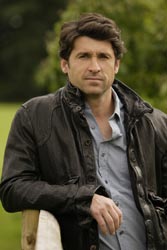 Patrick Dempsey: He has great taste in cars because he was driving the Jag. I have a similar car to that and Paul [Weiland, the director] said: “Let’s put that in the movie. That would be a good car for him to drive.”
Patrick Dempsey: He has great taste in cars because he was driving the Jag. I have a similar car to that and Paul [Weiland, the director] said: “Let’s put that in the movie. That would be a good car for him to drive.”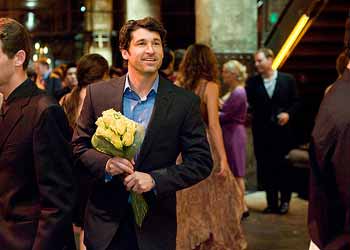 PD: Yes, much better. We decided to go right into therapy as a couple to get rid of any dynamics that were unwarranted.
PD: Yes, much better. We decided to go right into therapy as a couple to get rid of any dynamics that were unwarranted.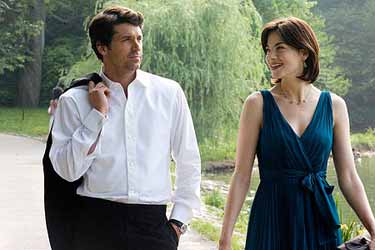 PD: She was a blast to work with. So easy going. She has a great laugh. And she’s one of the few actresses I’ve worked with who doesn’t have a bad day. She came in and had a great day everyday. She was never moody. I couldn’t believe it! She was willing to try anything and she just showed up and had a good time. That was the energy we needed for that character and that’s who she should have been, and that’s who she is.
PD: She was a blast to work with. So easy going. She has a great laugh. And she’s one of the few actresses I’ve worked with who doesn’t have a bad day. She came in and had a great day everyday. She was never moody. I couldn’t believe it! She was willing to try anything and she just showed up and had a good time. That was the energy we needed for that character and that’s who she should have been, and that’s who she is.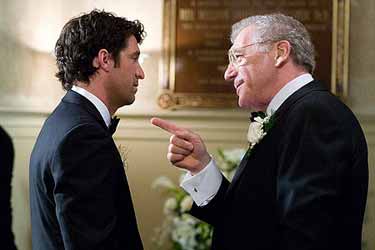 PD: I will be regardless. I’ll go to my grave and that’s what they’ll say, because of the success of the show.
PD: I will be regardless. I’ll go to my grave and that’s what they’ll say, because of the success of the show.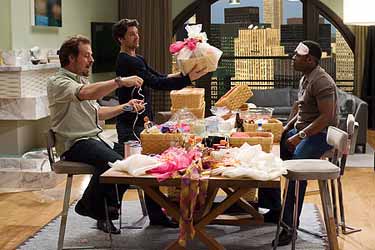 PD: I started off in a Vaudeville Troup in Maine when I was seventeen. Because of my ski-racing, I rode the unicycle. Then I started to learn how to juggle and I picked it up and started touring with the Vaudeville Troup and developing my own show and that’s how I made money on the weekends as a kid. I did juggling and comedy and slap stick. It’s cool because the comedians I liked are all from the forties and fifties and Cary Grant was the coolest, in the sense that he was the best slapstick, but he presented himself as this charming leading man. His slapstick is unbelievable. It’s so unexpected.
PD: I started off in a Vaudeville Troup in Maine when I was seventeen. Because of my ski-racing, I rode the unicycle. Then I started to learn how to juggle and I picked it up and started touring with the Vaudeville Troup and developing my own show and that’s how I made money on the weekends as a kid. I did juggling and comedy and slap stick. It’s cool because the comedians I liked are all from the forties and fifties and Cary Grant was the coolest, in the sense that he was the best slapstick, but he presented himself as this charming leading man. His slapstick is unbelievable. It’s so unexpected.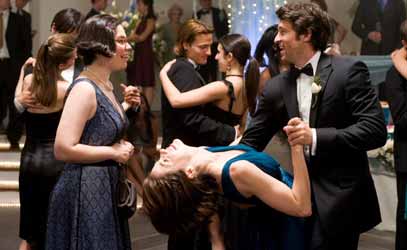 PD: A little bit of both. I think you have to have some discipline but at the same time you need to say screw the rules.
PD: A little bit of both. I think you have to have some discipline but at the same time you need to say screw the rules.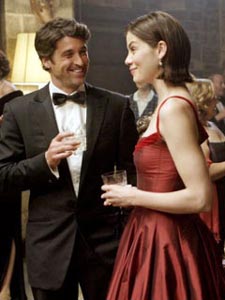 PD: It was sort of when I backed off and stopped caring when it all came together. I think it came when I met my wife and there was a feeling of validation and love and support there, that I just stopped caring about the business. I bought a farm in Maine and I knew I could always go back there, and I’d come along way and I’d be alright. Once I stopped caring, stuff started opening up. I guess I probably wasn’t projecting desperation or something like that. I think that’s the key, I didn’t care, I could take it or leave it. And still to a certain extent I don’t and I do. Enough to be professional, but at the same time, there’s other stuff I can go and do and be very happy about doing that.
PD: It was sort of when I backed off and stopped caring when it all came together. I think it came when I met my wife and there was a feeling of validation and love and support there, that I just stopped caring about the business. I bought a farm in Maine and I knew I could always go back there, and I’d come along way and I’d be alright. Once I stopped caring, stuff started opening up. I guess I probably wasn’t projecting desperation or something like that. I think that’s the key, I didn’t care, I could take it or leave it. And still to a certain extent I don’t and I do. Enough to be professional, but at the same time, there’s other stuff I can go and do and be very happy about doing that.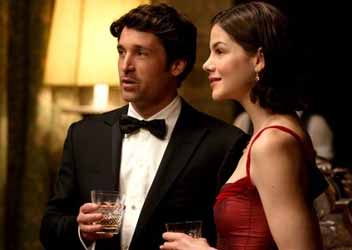 PD: Ayrton Senna is the most interesting, because he talked about his spiritual connection to driving and we talk about that a lot with my coach and driving. There’s an emotional space you have to get into in order to allow the car and yourself to do it. It’s a kind of an outer body experience and when he made that statement, people thought he was crazy, but I think he has since pushed the psychological aspect of the sport. He’s really changed it and has opened it wide open.
PD: Ayrton Senna is the most interesting, because he talked about his spiritual connection to driving and we talk about that a lot with my coach and driving. There’s an emotional space you have to get into in order to allow the car and yourself to do it. It’s a kind of an outer body experience and when he made that statement, people thought he was crazy, but I think he has since pushed the psychological aspect of the sport. He’s really changed it and has opened it wide open.